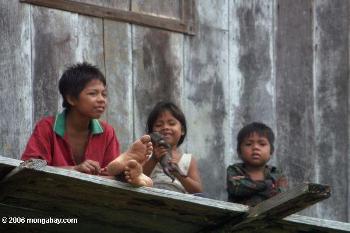Last week the Reducing Emissions from Deforestation and Forest Degradation (REDD) program received a jump start with a four billion US dollar pledge from a number of industrialized nations. Under REDD tropical forest nation will be paid to keep forests standing, however the program—as it currently stands—has provoked concern over the rights of the some 350 million people living in or adjacent to forests.
The Accra Caucus on Forests and Climate Change, a coalition of some 100 organizations from 38 countries, has released a report outlining an alternative vision of REDD that would uphold the rights of local and indigenous people while protecting forests.
“When forest-dependent communities gain control over forest resources, they are best at protecting them against destruction by others. Providing REDD funding to industrial logging or strict nature conservation programs that do not respect local peoples’ rights and usages of the forest could be counter-productive, and fuel conflict and poverty,” explains Nat Dyer of the Rainforest Foundation UK, which is a member of the coalition making up the Accra Caucus on Forests and Climate Change.
 Ticuna children playing with rodent in Colombia. Photo by: Rhett A. Butler. |
According to the report a REDD agreement must include three policies to ensure the rights of indigenous groups: full and effective participation of local peoples; recognition of indigenous land rights; and employing community-based forest management, which allows for sustainable forest use by local communities.
In addition no REDD deal should be made without ‘free, prior and informed consent’ of indigenous groups as outlined by the UN.
“There are concerns that REDD may allow polluters in the North to continue ‘business as usual’ while removing land and resource rights from forest-dependent peoples in the global South,” the report states.
For example, according to the report, the definition of ‘forests’ used in REDD must ensure that forest areas which are turned into plantations or industrially logged are ineligible for payments.
“Climate negotiators need to recognize that the aim of a global REDD agreement is to protect the forest, not to raise money. The concerns of the people must be heard at the negotiating table, as well as integrated into local forest programs,” Rahima Njaidi from the Tanzanian Network of Community Forest Associations (MJUMITA) said. MJUMITA is a member of the Accra Caucus on Forests and Climate Change.
The report calls on REDD policy-makers to recognize that an effective program must go beyond simply concerns with carbon, but also include the preservation of biodiversity and the rights of the local people to use the forest sustainably.
At this point the report labels REDD ‘a double edged sword’, which if wrongfully executed could “have serious negative consequences, environmentally and socially, while doing little to reduce carbon emissions.”
Deforestation in the tropics contributes between 12-17 percent of the world’s greenhouse gas emissions.
Related articles

Taking back the rainforest: Indians in Colombia govern 100,000 square miles of territory
(05/10/2010) Indigenous groups in the Colombian Amazon have long suffered deprivations at the hands of outsiders. First came the diseases brought by the European Conquest, then came abuses under colonial rule. In modern times, some Amazonian communities were virtually enslaved by the debt-bondage system run by rubber traders: Indians could work their entire lives without ever escaping the cycle of debt. Later, periodic invasions by gold miners, oil companies, colonists, and illegal coca-growers took a heavy toll on remaining indigenous populations. Without title to their land, organization, or representation, indigenous Colombians in the Amazon seemed destined to be exploited and abused. But new hope would emerge in the 1980s, thanks partly to the efforts of Martin von Hildebrand, an ethnologist who would help indigenous Colombians eventually win control over 260,000 square kilometers (100,000 square miles) of Amazon rainforest—an area larger than the United Kingdom.
$6B forest conservation plan lacking in transparency, indigenous participation, say activists
(04/13/2010) The process to establish REDD+, a proposed climate change mitigation mechanism that would reduce greenhouse gas emissions by funding conservation and sustainable management of tropical forests (REDD+), is lacking in transparency and failing to include civil society organizations and indigenous peoples, say activists across forty NGOs.
Illegal loggers hit community reforestation project in Indonesia, spurring questions about REDD
(02/22/2010) Illegal loggers are targeting community-managed forests in South Sumatra, renewing questions over forestry governance and law enforcement as the Indonesia prepares to capitalize on payments for conservation and reforestation under a proposed climate change mitigation mechanism known as REDD, reports the Jakarta Press.